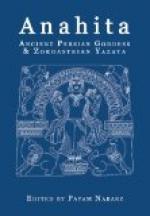|
This section contains 605 words (approx. 3 pages at 300 words per page) |

|
YAZATAS. The term yazata occurs in the Avesta, the collection of sacred books of Zoroastrianism, as an attribute or designation of divine beings. From this term is derived the Middle Persian yazd ("god"; pl., yazdān). The word appears frequently in the Avesta, although not in the five Gāthās ("songs") attributed to Zarathushtra (Zoroaster); in Gathic it appears only in the Yasna Haptanhāiti (Yasna of the Seven Chapters), ascribed to Ahura Mazdā. Its meaning in this text is "worthy of worship, worthy of sacrifice" (from the verb yaz, "to venerate, sacrifice"), identical to that of its Vedic counterpart, yajata. This is the general meaning of the term, which is used to refer to divine beings, usually secondary gods, personifications, or cult gods of the pre-Zoroastrian Indo-European pantheon that had been absorbed into the religion. Thus, as Zoroastrianism reached a compromise with ancient polytheism, yazata came...
|
This section contains 605 words (approx. 3 pages at 300 words per page) |

|


